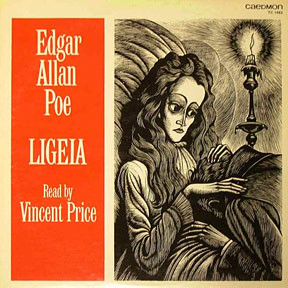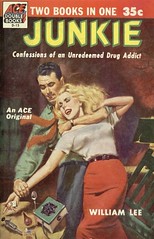
For lack of a better illustration: Ligeia read by Vincent Price
The Imp of the Perverse is a metaphor for the common tendency, particularly among children and evildoers, to do exactly the wrong thing in a given situation. The conceit is that the misbehavior is due to an imp (a small demon) leading an otherwise decent person into mischief.
The phrase has a long history in literature, and was popularized (and perhaps coined) by Edgar Allan Poe in his short story, “The Imp of the Perverse“. It is a study in guilt or the human thirst for self-destructive behaviour.
“Guilt” should not be taken here in either the standard legal or moral senses. Poe’s characters usually do not feel “guilt” because they did a “bad” thing—that is, the story is not didactic (in his essay “The Poetic Principle” Poe called didacticism the worst of “heresies”); there is no “moral to the story.” Guilt, for Poe, is “perverse,” and perverseness is the desire for self-destruction. It is completely indifferent to societal distinctions between right and wrong. “Guilt” is the inexplicable and inexorable desire to destroy oneself eo ipso.
The Poe Decoder notes that “When Poe speaks of perverseness, he does not intend narrower denotations of the various forms of the word. He does not mean “perverted,” as in sexual miscreance. Though such deviancy may be perverse, it bears little resemblance to the examples of perversity which Poe elucidated in his tales.” As such, Poe’s interpretation of perverseness deserves a prominent place in the history of irrationalism.
In Poe’s words:
“… no reason can be more unreasonable; but in fact, there is none more strong. With certain minds, under certain conditions, it becomes absolutely irresistible. I am not more certain than I breathe, than that the assurance of the wrong or error of any action is often the one unconquerable force which impels us, and alone compels us to its prosecution. Nor will this overwhelming tendency to do wrong for the wrong’s sake, admit of analysis, or resolution into ulterior elements. It is a radical, primitive impulse–elementary.”
and
“We stand upon the brink of a precipice. We peer into the abyss – we grow sick and dizzy. Our first impulse is the shrink away from the danger. Unaccountably we remain… it is but a thought, although a fearful one, and one which chills the very marrow of our bones with the fierceness of the delight of its horror. It is merely the idea of what would be our sensations during the sweeping precipitancy of a fall from such a height… for this very cause do we now the most vividly desire it.”
See also:
Interpretation of The Raven, The Imp of the Perverse and The Black Cat.
The Poe decoder, I am Safe!
The Imp of the Perverse is also masterfully exemplified in The Bad Glazier, a prose poem by Baudelaire collected in Paris Spleen:
Baudelaire’s prose poem “The bad glazier” is a marvelous example of the imp of the perverse; after a discourse on personality and action, a man calls a glazier up to his fourth-story apartment. He inspects the glazier’s glass, “discovers” that there is no colored glass in the man’s pack (which we sense he may have known all along), and sends the glazier back on his way. When the poor glazier reaches the ground floor and leaves the building, our protagonist throws a flower pot at him and breaks his glass. “And drunk with my madness,” the protagonist tells us, “I shouted down at him furiously: ‘Make life beautiful! Make life beautiful!'” Rachel Barenblat via www.webdelsol.com/InPosse/barenblat.htm










